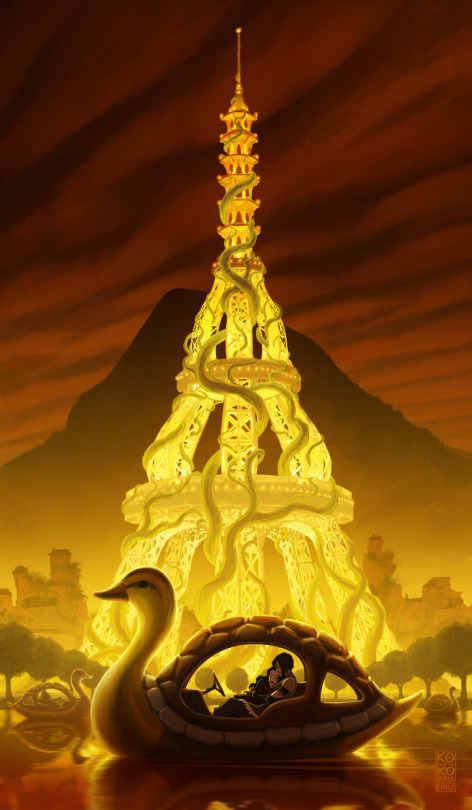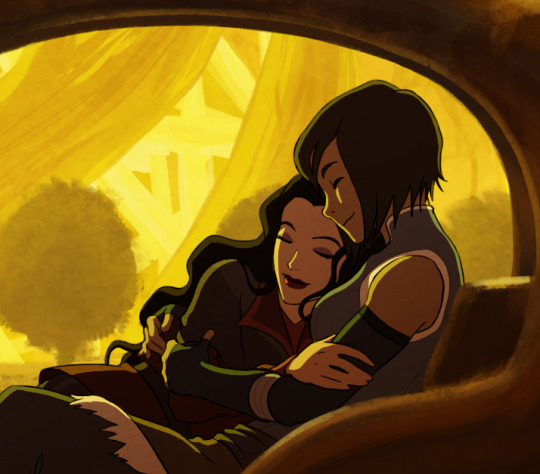You are using an out of date browser. It may not display this or other websites correctly.
You should upgrade or use an alternative browser.
You should upgrade or use an alternative browser.
Avatar: The Last Airbender & Korra (SPOILERS)
- Thread starter looneymoon
- Start date
Carlie
CltrAltDelicious
- AKA
- Chloe Frazer
To me, this show is really about finding yourself. I knew what I wanted to do with it because I’d wanted to develop the end credits for the whole series. That’s my favorite cue in the whole series - such a simple little thing. When Korra started, I was emotionally going through some stuff. Both my parents had died. My dad had died suddenly in the middle of Avatar and my mom died suddenly right before Korra and I was just like, fuck this man. I’m just laying my emotions out a little bit. And it made sense to me because Korra was a teenager and teenagers go though a lot of stuff emotionally. All along I’d been looking for an opportunity to extend that end credits and I never could find one until that last scene, so when I watched that last act and I knew it’d work definitely, I was so happy. I would get spotty notes, which tell me where there needs to be music. The final episode spotty notes: Transition to score for this last sequence. They will hold hands and turn to each other in the end, so we’d like to have a more romantic feel for this last sequence to support the intention that these lovely ladies are going to get together. I was totally surprised. I couldn’t sleep – I was so happy.
You start with this pitch percussion. Then we have these strings in the background that are just doing these really simple long notes. I wanted to keep it pretty minimal so we had room to grow. Also, it’s a very sorta peaceful moment, you know, they’re looking across the water and you realize they’ve really come a long way together and I just wanted to reflect that a bit. The end credits melody starts with the zhonghu and then it goes out of the range of the zhonghu, so erhu takes over. Erhu is a two string Chinese instrument. There are no frets or anything, so it’s extremely vocal with a lot of sliding into notes and sliding around and it’s extremely lyrical. That arpeggio part is a kalimba and for the end credits it’s only kalimba, but for this I sweetened it with some pegasus. Pegasus is a pitch percussion instrument with mallets, and then there’s the glockenspiel. It’s really simple, but together it sounds layered. And the strings now are playing the melody instead of zhonghu. I’m just using a trio: violin, viola, and cello. So here Asami shows up, and there’s things called shippers, which is a thing I had never known about until way into this show. And it’s these tweens and adults of all ages that vie for these different relationships and characters getting together. There were people who wanted Korra and Asami to get together, and so when Asami shows up it’s this moment for all these fans and it’s clearly a romantic moment. The Chinese instruments left for a little moment to give us some room and now it comes back with the end credits melody and it’s sorta wrapping up here to the last build. Korra and Asami are talking about how maybe they should go away together - a kid’s show showing a bisexual relationship and I wanted the music to reflect that this is a historic moment.
One of the first things I wrote in the series – the Avatar series – became a really important simple little theme. I kind of wanted that to come back for me, selfishly. People who had been through this show and are thinking, oh my god this franchise – this whole thing that I’ve been through and this experience and I was a kid when I watched this show and now I’m a teenager or young adult or whatever – this series is coming to an end and we’ve all been through it together: fans, all the production, and the crew. This huge chunk of life had just zipped by. And so I end on this little melody that is from the first series. All this time has passed, and I wanted them to sort of feel all that time.
Also JK Smimmons won an Oscar for Best Supporting Actor:
Airling
Ninja-Fairy-Jedi-Princess
I am very behind on this (I mean, this show did have it's 10th anniversary this past week), and I haven't read too much here for fear of spoilers. But we just finished watching TLA. I loved it SOOOOO MUCH! It was such an emotional roller coaster! I love that Aang found a way to stay true to his own feelings on the matter, but still resolve the issue. True badass.
But I'm kind of crushed by one thing. And it's a rather strange thing for me to be on about. I really, really, RRREEEEAAALLLYY wanted Katara and Zuko to end up together. From about the 3rd or 4th episode already, which is as I said not the sort of thing I normally do when watching a new show. And then they have that scene in Ba Sing Se. And just generally kick ass together at the end... And BAM! nothing.
Benj spoilered me and I knew it was going to be Aang and Katara in the end. But somehow I'm just more disappointed now that I've seen it for myself. A lot.
But I'm kind of crushed by one thing. And it's a rather strange thing for me to be on about. I really, really, RRREEEEAAALLLYY wanted Katara and Zuko to end up together. From about the 3rd or 4th episode already, which is as I said not the sort of thing I normally do when watching a new show. And then they have that scene in Ba Sing Se. And just generally kick ass together at the end... And BAM! nothing.
Benj spoilered me and I knew it was going to be Aang and Katara in the end. But somehow I'm just more disappointed now that I've seen it for myself. A lot.
Tetsujin
he/they
- AKA
- Tets
From Bryan Konietzko's tumblr:


http://bryankonietzko.tumblr.com/post/112732303027/turtle-duck-date-night-this-is-my-piece-for-the


Turtle-duck Date Night
This is my piece for the upcoming The Legend of Korra / Avatar: The Last Airbender Tribute Exhibition at Gallery Nucleus, opening this Saturday, March 7th, 6:00pm to 10:00pm. Mike and I will be there doing a signing for the first half of the reception (there are a limited number of spots in the signing line, but I’m not sure how they are working that), and hanging out for the rest. I think there will be a raffle, and plenty of cool stuff to purchase. A bunch of the crew members from the production will be there too (hopefully including some ATLA folks), so it is going to be a fun family reunion for us. I can’t wait to see all of the incredible artwork.
As for this piece, I used and modified Emily Tetri's production painting of Harmony Tower (designed by Lee Jung-Su). Otherwise, I drew and painted the rest of it. I based the turtle-duck boats on the charming swan boats I saw while visiting Ueno Park in Tokyo. Gallery Nucleus will be selling the above artwork as an exclusive print, in a limited edition of 100, to be released on opening night (and I’m pretty sure I’ll be signing them). I will be donating 100% of my share of the proceeds to an LGBTQ suicide prevention hotline.
I hope to see you Saturday! Get there early, as the lines for these Gallery Nucleus openings wrap all the way around a city block. If you can’t make it to the opening, the show will be hanging for two weeks. There is an event being planned for the closing as well. More on that later.
http://bryankonietzko.tumblr.com/post/112732303027/turtle-duck-date-night-this-is-my-piece-for-the
Clement Rage
Pro Adventurer
Hmm...something that always bugged me about Avatar/Korra was that
the guys have to work to be redeemed, the women do not. Mai and Ty Lee were accepted back into the fold immediately. Azula's defeat was played as a sad occasion, while Zuko had to struggle for every bit of forgiveness he got.
In Korra, the only major female villain who has the highest kill count of all of them gets immediately redeemed, while Hiroshi takes four years of genuine repentance and still needs to die before it takes, ultimately to set up a romance.
Possible counterexamples
Varrick: Comic relief.
Earth Queen:Killed by the villain, forgiveness or lack thereof doesn't come into it.
In Korra, the only major female villain who has the highest kill count of all of them gets immediately redeemed, while Hiroshi takes four years of genuine repentance and still needs to die before it takes, ultimately to set up a romance.
Possible counterexamples
Varrick: Comic relief.
Earth Queen:Killed by the villain, forgiveness or lack thereof doesn't come into it.
Clement Rage
Pro Adventurer
Edit: Just to be clear, I don't mind the romance, I was pretty impressed that Nick let it happen, but I don't think
Hiroshi had to die to make it happen.
Korra never quite got back to the heights of season one for me.
Korra never quite got back to the heights of season one for me.
trash panda
---m(O.O)gle---
- AKA
- Howl
Looks like there might be some trash bending going on there too...or magazine bending or whatever those random paper flyers are. 

Carlie
CltrAltDelicious
- AKA
- Chloe Frazer
BadRapSample
Lv. 1 Adventurer
I really expected Varrick to go full Hojo there. That didn't happen.
trash panda
---m(O.O)gle---
- AKA
- Howl
http://io9.com/korra-co-creator-bryan-konietzkos-new-graphic-novel-loo-1716174271
GAAAAAAAAAAAAAAAAAAAAAAAAAAAAAAAAAAAASP
I'm ready. Take ALL my money.
GAAAAAAAAAAAAAAAAAAAAAAAAAAAAAAAAAAAASP
I'm ready. Take ALL my money.

trash panda
---m(O.O)gle---
- AKA
- Howl
AAAAAAAAAAAAAAAAAAND:

Apparently going on sale in August for around $99.

Apparently going on sale in August for around $99.
trash panda
---m(O.O)gle---
- AKA
- Howl
^I'll take it. 

















